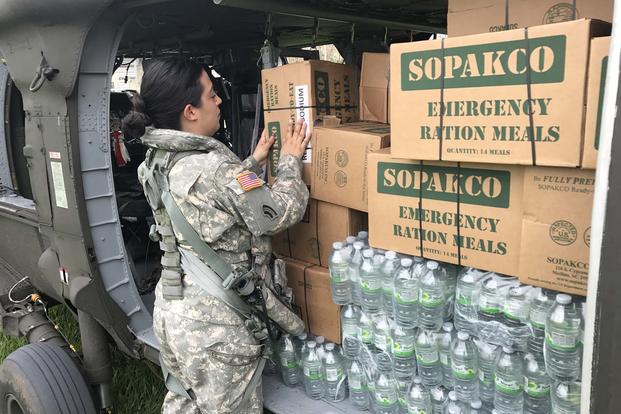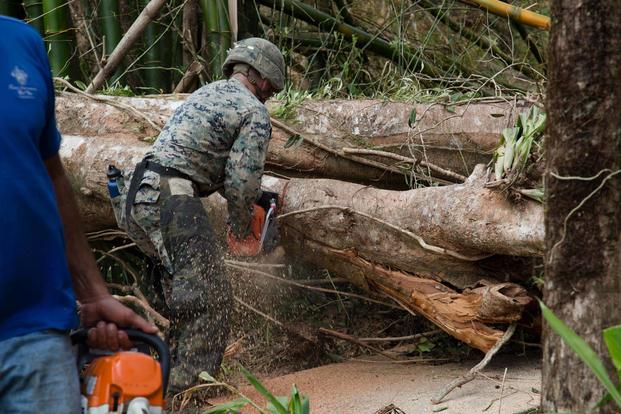San Juan's mayor Friday slammed the Trump administration's "good news" report on the relief effort as the already devastated island braced for heavy rains and more flash flooding through the weekend.
Shelters reportedly have been running out of supplies, Puerto Ricans waited for five and 10 hours in lines for the basics, hospitals were without power, homes were without roofs, and communications were limited to satellite phones and the U.S.
Army Corps of Engineers rushed to shore up a dam in danger of collapse.
Of the 69 hospitals in Puerto Rico, only one was fully operational, 55 were partially operational, five were closed, and the status of eight others was as yet unknown, the Defense Department said in a statement.
The hospital ship USNS Comfort left port in Norfolk, Virginia, Friday for Puerto Rico to provide emergency medical assistance and was expected to arrive in about five days, the Pentagon said.
"People have never seen anything like this," President Donald Trump said. "We've undertaken a massive federal mobilization to assist Puerto Rico" to include 10,000 federal civilian and 5,000 military personnel, he said in pushing back on growing criticism of the pace and scope of the response.
The frustration of Puerto Ricans boiled over in the angry response of San Juan Mayor Carmen Ruiz Yulin to a Trump administration official who said the relief effort thus far has been a "good news story."
Related content:
- Hospital Ship Heads to Puerto Rico as Military Struggles to Direct Aid
- Damaged Ports and Airfields Limiting Puerto Rico Aid Effort: Dunford
- What Hurricane Response Activation Means for National Guard Families
On Thursday, Homeland Security Secretary Elaine Duke said, "I know it is really a good news story in terms of our ability to reach people and the limited number of deaths that have taken place in such a devastating hurricane." Duke said.
"Well, maybe from where she's standing it's a good news story," Yulín Cruz told CNN Friday.
"When you're drinking from a creek, it's not a good news story. When you don't have food for a baby, it's not a good news story. When you have to pull people down from buildings -- I'm sorry, that really upsets me and frustrates me," Yulin Cruz said.
"Dammit, this is not a good news story," she added. "This is a 'people are dying' story. It's a life-or-death story."
Through Thursday, the confirmed death toll in Puerto Rico from Hurricane Maria was 16.
Several members of Congress, including Sen. Marco Rubio, R-Fla., said the administration should consider putting the military in total charge of the response as the island braced for a weekend of heavy rains.
The National Weather Service said flash flood warnings would remain in effect for Puerto Rico through late Sunday night due to thunderstorms expected to hit the island and the U.S. Virgin Islands.
Rainfall amounts of 2 to 4 inches with locally higher amounts (were) likely each day," the NWS said. "As a result, the current flood situation will be aggravated."
The immediate concern was the status of the cracked Guajataca dam in Puerto Rico's northwest, where thousands of residents have been under an evacuation order.
The Guajataca dam was one of the 38 on the island. All have been rated by the U.S. Army Corps of Engineers (USACE) as having a "high potential hazard."
Ahead of the weekend storms, USACE delivered 900 "super sandbags," each weighing about 5,000 pounds, to shore up the Guajataca dam.
To bolster the military response, the Navy on Friday recalled the amphibious assault ship Wasp, which was assisting hurricane response efforts in the Leeward Islands of the Caribbean, for duty off Puerto Rico.
The Wasp will join the amphibious assault ship Kearsarge and the transport dock ship Oak Hill off Puerto Rico.
The ships will remain in the area although the military effort has shifted from a sea-based to a land-based response under the command of Army Lt. Gen. Jeff Buchanan, deputy commander of U.S. Army North. Buchanan arrived in Puerto Rico late Thursday, U.S. Northern Command said in a statement.
NorthCom has overall responsibility for the military response in Puerto Rico and the Virgin Islands while U.S. Southern Command, working through the State Department, was focusing on the Leeward Islands.
Marines from the 26th Marine Expeditionary Unit aboard the Kearsarge and sailors from the Kearsarge and the Oak Hill conducted nine medical evacuation missions, and distributed approximately 150,000 pounds of relief supplies and cargo on Thursday, NorthCom said.
The Marines also cleared three miles of roads leading to the former Naval Air Station of Roosevelt Roads on the eastern end of Puerto Rico to open it to ground traffic, NorthCom said.
In an Air Force briefing at the Pentagon Thursday, Brig. Gen. Keith Wark, director of operations for the National Guard Bureau, said that Guard and Reserve airlift into Puerto Rico and the Virgin Islands was averaging about 50 missions daily. "I'm expecting to maintain this level of effort for at least the next two weeks," Wark said.
"We're looking at some pretty big muscle movements across DoD if we have to go in and provide the level of troop efforts that we think we are," Wark said.
In addition, "there's planning factors for up to 10,000 additional Guardsmen. If we have to do that -- that's a big if -- that's going to be a significant amount of capability," Wark said.
What the Air Force is doing now "is making sure we're sequenced across FEMA, the active force, the Guard response, and make sure that's all synchronized to get things to the various airfields" for relief in Puerto Rico and the Virgin Islands, he said.
Initially, the main problem was clearing roads around the airfields to allow relief distribution, Wark said. As a result, massive supply distribution has been a challenge, especially in Puerto Rico, he said.
Air Force spokesman Col Patrick Ryder said that since Hurricane Maria hit nine days ago, Air Mobility Command has flown nearly 200 sorties, delivering about 1,500 tons of cargo such as food and water, communications equipment, generators, and medical supplies to both Puerto Rico and the Virgin Islands.
Ryder said AMC air medical evacuation teams have moved 104 patients from St. Croix, including one mission on Sept. 24 that moved 34 patients.
In an address to the National Association of Manufacturers Friday, Trump stressed that "We're closely coordinated with the territorial and local governments, which are totally and, unfortunately, unable to handle this catastrophic crisis on their own -- just totally unable to."
"The police and truck drivers are very substantially gone. They're taking care of their families and largely unable to get involved, largely unable to help.
Therefore, we're forced to bring in truck drivers, security, and many, many other personnel, by the thousands. We've never seen a situation like this," he said.
"Ultimately, the government of Puerto Rico will have to work with us to determine how this massive rebuilding effort -- it will end up being one of the biggest ever -- will be funded and organized, and what we will do with the tremendous amount of existing debt already on the island," Trump said.
-- Oriana Pawlyk can be reached at oriana.pawlyk@military.com. Follow her on Twitter at @Oriana0214.
-- Richard Sisk can be reached at Richard Sisk@Military.com.






























